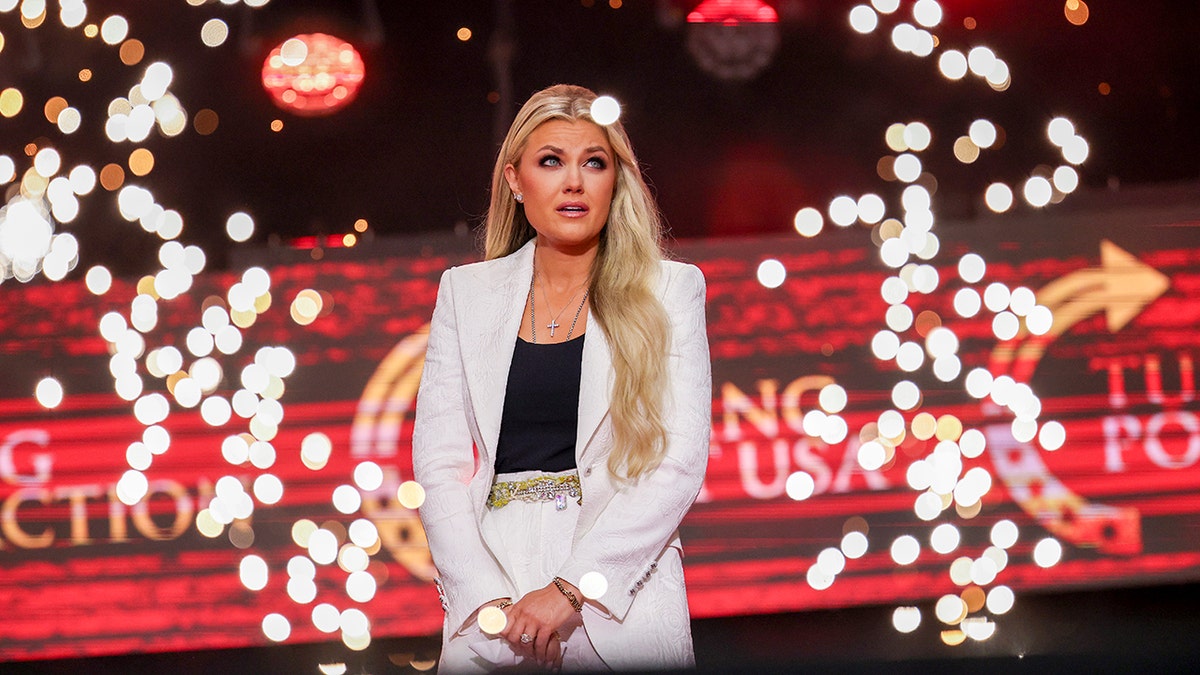Title: The $800 Million Storm — Erika Kirk, Turning Point USA, and the Showdown with George Soros
It started like a quiet legal filing, the kind that slips under the radar on an ordinary weekday. But within hours, it turned into a political earthquake. Erika Kirk — the poised, determined wife of conservative leader Charlie Kirk — and Turning Point USA had just launched an $800 million lawsuit against billionaire financier George Soros. The accusations? Nothing short of explosive: a vast, coordinated online smear campaign allegedly designed to destroy Charlie Kirk’s name, reputation, and influence.
The filing hit like thunder. News networks scrambled, social media exploded, and America suddenly found itself watching a new kind of war — one not fought with weapons or ballots, but with algorithms, fake profiles, and digital deception.

The Spark That Lit the Fire
According to the lawsuit, what looked like “organic public criticism” of Charlie Kirk online was anything but. Erika’s legal team described a sophisticated operation — troll farms, shell accounts, and funded online influencers — all allegedly coordinated to manufacture scandals, spread doctored images, and inject false narratives into the bloodstream of social media.
In simple terms: it was digital warfare.
What makes this case extraordinary isn’t just the number — eight hundred million dollars — but what it represents. For years, Americans have watched the growing influence of digital manipulation in politics. But this? This was the first time someone was calling out one of the most powerful figures in global philanthropy and accusing him of turning the internet into a battlefield.
Erika Kirk Steps Forward
When Erika Kirk appeared before reporters, she wasn’t just speaking as Charlie’s wife — she was speaking as a woman who’d watched the man she loved become the target of relentless online attacks. Her voice didn’t tremble, but the emotion was unmistakable.
“This isn’t about politics,” she said. “This is about truth, dignity, and the right of every American not to be destroyed by a lie.”
Behind her, a Turning Point USA banner waved under bright studio lights — bold, unflinching. Her words landed like a gavel. She wasn’t talking about partisan bickering; she was talking about defending reputation, faith, and fairness in an era when character assassination happens with a tweet.
For many watching, it was a moment of reckoning. Erika wasn’t just standing up for Charlie — she was standing up for everyone who’s ever been shredded by the viral machinery of online hate.
The Allegations
The legal complaint reads like a thriller. It accuses Soros-funded organizations of financing disinformation networks — “digital hit squads,” as the filing calls them — that seeded false stories about Charlie Kirk across multiple platforms.
Anonymous pages, coordinated hashtags, and timed releases of misleading “leaks” were allegedly part of a calculated campaign. Some of the claims were laughable, others downright malicious, but their effect was powerful. Search results changed. News cycles shifted. Advertisers hesitated. Reputations wobbled.
And behind it all, the lawsuit claims, was a paper trail of donations and shell foundations tied to Soros’s sprawling global network. Whether that connection can be proven in court is another story — but the accusations alone have already set Washington ablaze.

Turning Point’s Legal Fury
Turning Point USA’s statement was short but cutting:
“We are done being silent. For years, conservatives have been attacked, censored, and digitally erased. This lawsuit is the first step toward exposing how deep the manipulation goes.”
It wasn’t just about money. It was about pulling back the curtain on what the organization called the “industrial complex of digital defamation.”
Inside sources say Erika and her team have spent months collecting data, screenshots, and digital footprints from cybersecurity experts tracing how narratives about Charlie were allegedly seeded across multiple continents. If even part of that evidence holds up, it could send shockwaves through Silicon Valley and beyond.
Soros’s Silence and the Divide It Fuels
So far, George Soros has not issued a direct response. His representatives have brushed off the allegations as “baseless political theater,” saying the lawsuit is a “distraction tactic.” But the silence only adds to the tension.
The country is now split — as always — between believers and skeptics. Supporters of Charlie and Erika call it a brave act of truth-seeking, a pushback against unchecked power. Critics say it’s an attention grab, another “culture war headline” designed to rally conservative donors.
Yet even critics admit one thing: the lawsuit has forced a long-overdue conversation about the hidden architecture of online influence — and who really controls it.
Beyond the Politics
Behind the firestorm is something more human. The story of a couple whose lives became public property, whose faith and values were mocked online, and who finally said: enough.
For Erika, this isn’t about taking down George Soros. It’s about setting a line in the sand. “There’s a difference between disagreement and destruction,” she told one interviewer. “When powerful people decide to ruin someone with lies, that’s not politics. That’s evil.”
Her words echoed across social media, resonating with millions who’ve watched reputations get shredded overnight by anonymous mobs.
And somewhere amid the chaos, a quiet truth hangs in the air — maybe this case isn’t just about the Kirks or Soros, but about what kind of digital world we’ve built for ourselves.

What Comes Next
Legal experts predict a long, grueling battle. Discovery could unearth private emails, contracts, and communication chains that reveal how political influence campaigns really operate. If the Kirks win, it could redefine accountability in the digital age — forcing billionaires, NGOs, and even tech companies to think twice before fueling online manipulation.
If they lose, it will still make history as one of the boldest defamation cases ever filed.
Either way, the court of public opinion is already in session.
The Larger Picture
Every generation has its defining political battles — moments when truth and power collide in ways that shape history. The lawsuit of Kirk vs. Soros might just be one of those moments. It’s not just a fight about defamation; it’s a clash between two visions of the future: one built on open debate, and another built on algorithmic control.
Erika Kirk’s courage in stepping forward has reminded millions that behind every headline is a human story — of faith, family, and resilience.
As one Turning Point volunteer said at a rally after the announcement, “They tried to bury us online, but they forgot we can still speak.”
Epilogue: The Storm Before the Truth
For now, America watches — divided, curious, but undeniably captivated. The courthouse steps have become a stage for something bigger than law: a test of transparency, courage, and belief.
In a world where narratives are built and broken in seconds, this lawsuit dares to ask: Who really writes the truth anymore?
As the headlines keep spinning and the lawyers prepare for battle, one thing is certain — this story is far from over. And in the heart of it stands Erika Kirk, not just fighting for Charlie, but for something larger — the idea that truth still matters in a world drowning in noise.


